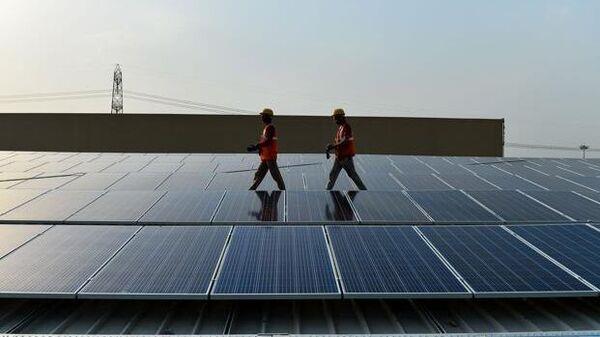
International Solar Alliance In Talks With Member States For Securing Critical Minerals, Says DG Ajay Mathur
This comes in the backdrop of ISA, the first treaty-based international government organization headquartered in India becoming a significant platform for New Delhi in terms of foreign policy, even as China attempts to co-opt countries into its ambitious One Belt One Road initiative. China is a major supplier of lithium-based batteries globally and several countries including India have been trying to develop domestic manufacturing capacities.
Also read |India dialling China for its lithium-ion cell ambitions despite tensions
“In the last decade, around 10–15% usage of lithium has reduced per battery. Another thing is that you develop not-in-kind substitutes. For example, sodium batteries. Sodium is more easily available than lithium. We have reached a point where technologically we can jump straight to sodium batteries instead of lithium batteries. That technology and possibility are something that we are working on with our member countries meaning helping them develop an R&D system for this,” the ISA DG said in an interview.
Potential applicationsSodium-ion batteries have several potential applications in India, including electric vehicles (EVs), consumer electronics, and industrial and energy storage. They offer a potential low-cost alternative to lithium-ion batteries for India. Rising demand for EVs and renewable energy has created the need to diversify into newer battery technologies, beyond lithium-ion batteries. The sodium-ion battery market was valued at $0.5 billion last year and is projected to reach $1.2 billion by 2028, growing at 21.5% CAGR between 2023 and 2028, according to market estimates.
Solar power is intermittent, which may impact grid stability. Storage systems help maintain the stability, thereby making battery storage energy systems key for growth of renewable energy.
Also read |Govt scientific advisor wants lithium alternatives explored amid global race
“The main thing in this is how we lead to a battery price decline. The batteries we get from China are cheaper. To address the issue, initially, we will have to provide a short-term subsidy to bring any other battery and make it cost competitive, which is why in India, production linked incentive are given for batteries (manufacturing),” he added.
Noting that China has already captured a significant portion of the lithium supply chain and has already made it cost effective, Mathur said that for other countries trying to get hold of share in the battery market, it would be beneficial to go for newer technologies.
"It is far better to go in for technologies that will be tomorrow's technology. For example, sodium, Based batteries. So that is what we are working with our member countries."
ACC programmeWith a budgetary outlay of ₹18,100 crore, the government in 2021 approved the National Programme on Advanced Chemistry Cell (ACC) Battery Storage, the new generation technology that can store electric energy either as electrochemical or chemical energy and convert it back to electric energy as and when required. The programme aims to achieve a manufacturing capacity of 50 gigawatt Hours (GWh) of ACC and enhance India's manufacturing capabilities.
He also said the ISA is working with its member countries on manufacturing batteries with imported cells.
Also read |EV battery rules are likely within a month The ISA was conceived as a joint effort by India and France to mobilize efforts against climate change through deployment of solar energy solutions. It was conceptualized on the sidelines of the 21st Conference of Parties (COP21) to the United Nations Framework Convention on Climate Change (UNFCCC) held in Paris in 2015. 119 countries are signatories to the ISA Framework Agreement, of which 100 countries are member countries.
Legal Disclaimer:
MENAFN provides the
information “as is” without warranty of any kind. We do not accept
any responsibility or liability for the accuracy, content, images,
videos, licenses, completeness, legality, or reliability of the information
contained in this article. If you have any complaints or copyright
issues related to this article, kindly contact the provider above.

















Comments
No comment